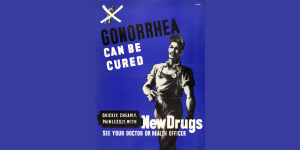
Syphilis Rates in Pregnant Women Continue to Rise
Syphilis rates among pregnant women went up 222% percent between 2016 and 2022 and another 28% between 2022 and 2024. This alarming increase shows too many pregnant women are not being screened.
Crabs:
Fast Facts
Most cases of crabs happen as a result of intimate contact, when crabs move from the pubic hair of one person to the pubic hair of another. Even when there is no sexual penetration, you can get crabs or give them to someone else if you’re in close physical contact—whenever some part of your body that has coarse hair (such as the pubic area, eyelashes, eyebrows, facial hair, chest, or armpits) comes into contact with the another person’s infested pubic or other course hair. Crabs do not usually attach to head hair.
Crabs can also be passed on in non-sexual ways. For example, it is possible for a person can get crabs from sleeping in an infested bed, using infested towels, or wearing infested clothing. Toilets seats? While not entirely impossible, getting crabs this way would be extremely rare. Not only is the surface of a toilet seat to smooth for crabs to hold on to, but they also don’t live long away from a human body.
The most noticeable symptom is often intense itching that usually starts about 5 days after a person gets crabs. This itching is caused by an allergic reaction to the bites.
A person may be able to see individual crabs by looking closely or using a magnifying glass. Crabs are small parasites that resemble crabs you see on the beach. They may be whitish-gray or rust colored.
A person may also notice crab eggs—or nits—attached to the base of the hair (close to where it comes out of your body). Nits are small, oval-shaped and pearl-like in color. Dark or bluish spots can appear and last for several days in the infested area; these are also a result of the bites.
Crabs are usually found in the pubic area. However, crabs can also be found in the armpits, eyelashes, beard/mustache and other course hair. Crabs are only very rarely found in the hair on a person’s head.
Crabs, in general, don’t cause anything more than discomfort and inconvenience. Occasionally, secondary bacterial infections may occur due to aggressive scratching.
You can usually see the crabs yourself if you look closely enough. You might need a magnifying glass to help you identify them. If you are uncertain, have a healthcare provider examine you. He or she may need to use a microscope.
Recommended treatments for crabs include:
Permethrin cream
Lindane shampoo (Kwell®)
NOTE: Lindane (Kwell®) is potentially harmful and may cause central nervous system complications, even though no problems have been known to occur in treatments limited to the recommended 4-minute period.
Pyrethrins with piperonyl butoxide
For infested eyelids and eyebrows an ointment is available by prescription.
Even if treatment is successful, you may still have some itching as a result of a skin irritation or allergic reaction. If so, you can use hydrocortisone cream to help stop the itching.
If you find out you have crabs, it is important that you talk to your partner or partners as soon as you can so they can get treatment. It is possible to pass crabs back and forth. If you get treated and your partner doesn’t, you may get infected again.

Syphilis rates among pregnant women went up 222% percent between 2016 and 2022 and another 28% between 2022 and 2024. This alarming increase shows too many pregnant women are not being screened.

At the end of 2025, the American Cancer Society released its new cervical cancer screening guidelines. In January 2026, the Health Resources and Services Administration endorsed a new set of guidelines as well. Both suggest HPV screening with self collected samples is an acceptable option.

Research suggests that only one dose of the HPV vaccine may be effective enough to prevent HPV-related disease, including cancer.

Australia has been a leader in HPV-prevention and cervical cancer screening for decades. Because of this, it is now close to eliminating cervical cancer entirely. However, recent drops in vaccination and screening rates threaten this progress.

The FDA approved two new drugs to treat gonorrhea The new drugs—gepotidacin and zoliflodacin—are both new kinds of antibiotics and represent the first completely new treatment options in over thirty years.

The American Cancer Society (ACS) released new recommendations for cervical cancer screening that focus on HPV testing and approve the use of self-collected samples. The recommendations also clarify the age at which screening should start and stop.

A committee that advises the Centers for Disease Control and Prevention (CDC) made an alarming change to the recommendations for the hepatitis B vaccine that will leave some infants unprotected.

A new report from the World Health Organization (WHO) warns of rising levels of drug-resistant gonorrhea. The data comes from reported cases of gonorrhea in 12 countries across five WHO regions.
ASHA believes that all people have the right to the information and services that will help them to have optimum sexual health. We envision a time when stigma is no longer associated with sexual health and our nation is united in its belief that sexuality is a normal, healthy, and positive aspect of human life.
ABOUT
GET INVOLVED
ASHA WEBSITES
GET HELP
© 2026 American Sexual Health Association
We need to know if we can keep you company during this visit. We are useful for making this site work.
We use cookies to enhance your browsing experience. You can choose which cookies you want to accept.
Necessary cookies help make a website usable by enabling basic functions like page navigation and access to secure areas. The website cannot function properly without these cookies.
| Cookie | Provider | Purpose | Expiry |
|---|---|---|---|
digiconsent | This website | Stores your cookie consent preferences. | 1 year |
wordpress_logged_in_* | WordPress | Identifies logged-in users and their authentication details. | 14 days / Session |
wordpress_sec_* | WordPress | Stores authentication details for secure areas. | 14 days / Session |
wp-settings-* | WordPress | Stores user interface customization preferences. | 1 year |
wp-settings-time-* | WordPress | Stores the time when wp-settings cookie was set. | 1 year |
Analytics cookies help us understand how visitors interact with our website by collecting and reporting information anonymously. This helps us improve our website.
Marketing cookies are used to track visitors across websites. The intention is to display ads that are relevant and engaging for the individual user.
Functional cookies enable the website to provide enhanced functionality and personalization. They may be set by us or by third party providers.